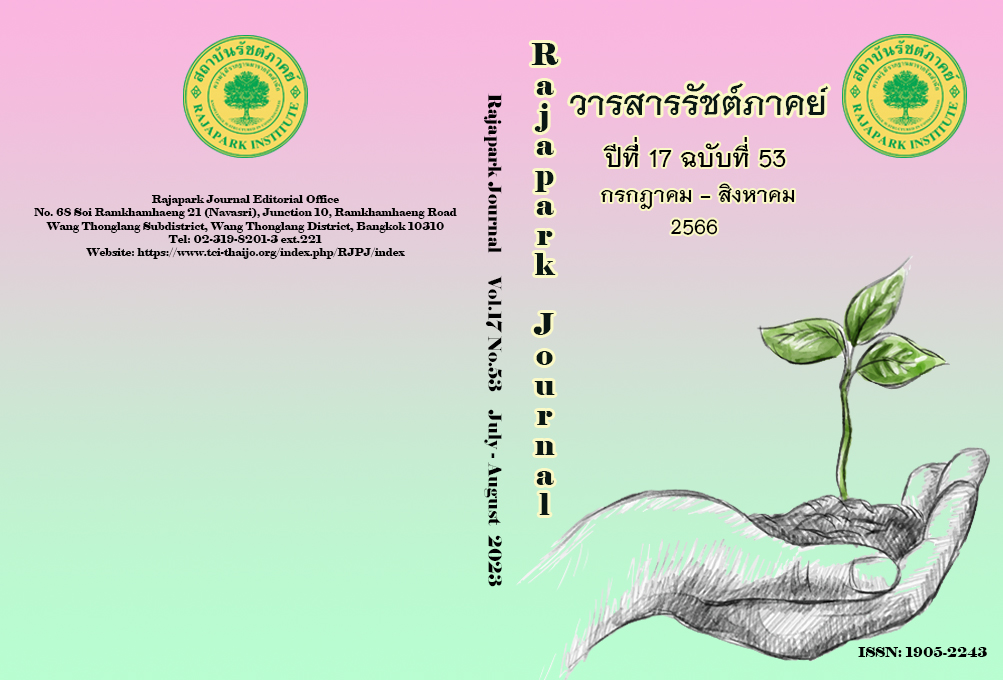A Causal Factors model of Strategic Information Technology Together with Competitive Advantage Strategy Affecting to The Franchise Business Success in Thailand
Main Article Content
Abstract
The purpose of this study was to study the influence of strategic information technology-oriented management by passing on competitive advantage strategies that affect the operational success of franchise businesses in Thailand. The sample for the study consists of 175 executives, including managers and business owners. The data will be analyzed using descriptive statistics, multiple regression equations, and structural equation models. The test results show that a strategic focus on information technology has a positive impact on strategy, competitive advantage, and operational success. Management focused on strategic information technology has a positive impact on operational success by passing on strategies for competitive advantage. Interestingly, the greatest impact on the operational success of franchise businesses in Thailand is the ability to exchange technology knowledge, followed by a focus on technology development and innovation. The resilience of the information technology infrastructure and the ability to respond rapidly demonstrate that franchise businesses prioritize the exchange of knowledge, the development of technology, and innovation, as well as competitive advantage strategies that emphasize quick response, cost leadership, and niche market focus. Tests have indicated that modern franchise businesses rely on strategic information technology to achieve their goals and maintain a competitive advantage.
Article Details

This work is licensed under a Creative Commons Attribution-NonCommercial-NoDerivatives 4.0 International License.
Views and opinions appearing in the Journal it is the responsibility of the author of the article, and does not constitute the view and responsibility of the editorial team.
References
Chiu, Chia-Nan., & Yang, Cheng-Liang. (2019). Competitive Advantage and Simultaneous Mutual Influences Between Information Technology Adoption and Service Innovation: Moderating Effects of Environmental Factors. Structural Change and Economic Dynamics, 49(C), 192-205.
Charunsiripaisan, C., Wangsom, C., Parichatnon, S., & Sukpun, S. (2022). Impact of the Coronavirus Disease 2019 (COVID-19) Pandemic on International Agricultural Trade. Academic Journal of Management Technology (AJMT), 3(1), 112-118. https://so03.tci-thaijo.org/index.php/jomt/article/view/255527
Chatreewisit, R. et al. (2011). Strategic Management. Pimdee Karnpim.
DBD Franchise Standard. (2018). Franchise Business Development Manual. www.dbd.go.th/download/article/article_20190704125536.pdf
Gomes, G., Seman, L.O., Berndt, A.C., & Bogoni, N. (2022). The Role of Entrepreneurial Orientation, Organizational Learning Capability and Service Innovation in Organizational Performance. Revista de Gestão, 29(1), 39-54. https://doi.org/10.1108/REGE-11-2020-0103
Hsu, Y.H., & Fang, W. (2009) Intellectual Capital and New Product Development Performance: The Mediating Role of Organizational Learning Capability. Technological Forecasting and Social Change, 76, 664-677. https://doi.org/10.1016/j.techfore.2008.03.012
Kanbunjong, P. (2012). The Effects of Efficiency of Modern Cost Management Application on Operational Success of Food Industry Businesses in Thailand[Master’s thesis, Mahasarakham University].
Krimjai, N., Seesura, P., & Deesukanan, C. (2018). Advantage on the Competitive Affects to Sustainable Development of Seafood Business in Thailand. Veridian E-Journal, Silpakorn University, 11(2), 1975-1993. https://he02.tci-thaijo.org/index.php/Veridian-E-Journal/article/view/143722
Lee-Partridge., J.E., Teo., T.S.H., & Lim., V.K.G. (2000). Information Technology Management: The Case of the Port of Singapore Authority. Strategic Information Systems, 85(9), 1975-1993. https://doi.org/10.1016/S0963-8687(00)00035-4
Nyadzayo, M., Matanda, M., & Ewing, M. (2016) Franchisee-based Brand Equity: The Role of Brand Relationship Quality and Brand Citizenship Behavior. Industrial Marketing Management, 52(1), 163-174.
Porter, M.E. (1990). The Competitive Advantage of Nations. Harvard Business Review. https://hbr.org/1990/03/the-competitive-advantage-of-nations
Roh, E.Y., & Yoon, J-H. (2009). Franchisor's ongoing Support and Franchisee's Satisfaction: A case of Ice Cream Franchising in Korea. International Journal of Contemporary Hospitality Management, 21(1), 85-99. DOI:10.1108/09596110910930205
Satchawatee, N., Boonlua, S., & Jantarajaturapath, P. (2020). The Effect of Strategic Technology Transfer Capability on Firm Outcomes: An Empirical Study from Information and Communication Technology Businesses in Thailand. Journal of Modern Management Science Lampang Rajabhat University, 13(1), 71-84. https://so03.tci-thaijo.org/index.php/JMMS/article/view/199087
Promma, C., Bhongchirawattana, U., & Songsrirode, N. (2019). The Relationship Between Modern Information Technology Application and Operational Efficiency of Food Industry Business in Thailand. Journal of Accountancy and Management, 11(1), 67-75. https://so02.tci-thaijo.org/index.php/mbs/article/view/210095
Rassameethes, B. (2007). Management of Technology. Saengdao.
Raymond, L. (2020). Information Technology-enabled Explorative Learning and Competitive Performance in Industrial Service SMEs: A Configurational Analysis. Journal of Knowledge Management, 24(7), 1625-1651.
Correia, R.J.V., Dias, J.G., & Teixeira, M.S. (2020). Dynamic Capabilities and Competitive Advantages as Mediator Variables Between Market Orientation and Business Performance. Journal of Strategy and Management, 14(2), 187-206. DOI:10.1108/JSMA-12-2019-0223
SMEONE. (2020, September 20). Strengths VS Disadvantages: Think Before Franchise Investment. https://smeone.info/posts/view/4488?category=25
SME Social Planet. (2020, February 21). Explore Franchise Investment Opportunities Economic Outlook. https://www.bangkokbanksme.com/en/investing-franchise-business
Thawornkasem, S., Attharangsun, N., & Konthong, K. (2015). Effects of Strategic Information Technology Orientation on Service Efficiency of Car Dealer Businesses in the Central Region of Thailand. Journal of Accountancy and Management, 7(3), 24-35.
Vimanyang, C., Chapawang, C., & Jirawuttinan, S. (2015). Effects of the Information System Management Efficiency on Competitive Advantage of the SMEs Business in Northeastern Thailand. Journal of Humanities and Social Sciences. Mahasarakham University, 34(3), 73-84.
Wootishingchai, C., & Wimoonard, T. (2018). Effects of Risk Management Efficiency on Organization Success of Small and Medium Enterprises in Nakhon Ratchasima Province. Faculty of Business, Administration Rajamangala University of Technology Isan.


